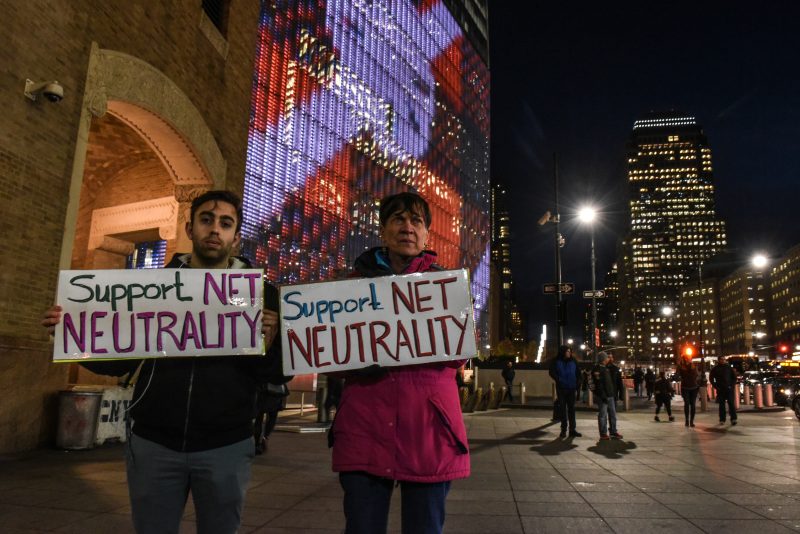US House passes ‘net neutrality’ bill unlikely to become law
Activists supporting net neutrality protested in front of Verizon’s headquarters on December 7, 2017 (STEPHANIE KEITH)
Washington (AFP) – The House of Representatives on Wednesday approved “net neutrality” legislation to require internet service providers to treat all online traffic equally, but the measure is unlikely to pass the Republican-controlled Senate and faces White House opposition.
The largely symbolic 232-190 vote on the “Save the Internet” bill aims to restore regulations approved in 2015 and then rolled back in 2017 in the latest back-and-forth over the contentious internet issue that has been debated for over a decade.
Net neutrality backers argue that clear rules are needed to prevent dominant internet service providers like Comcast, Verizon and AT&T from blocking or throttling services or websites for competitive reasons.
Some activists fear these providers will seek to extract higher fees from heavy data users, like Netflix or other streaming services, and steer consumers to their own offerings or those of paying partners.
Critics of net neutrality counter that the rules could stifle investment and innovation, and claim the internet is not designed for utility-style regulation from the 1930s.
Both sides in the debate say they are defending the “free and open” internet.
Phillip Berenbroick of the consumer group Public Knowledge said the House vote “reflects the overwhelming public consensus that strong net neutrality consumer protections are vital for the internet ecosystem and the digital economy.”
Ed Black of the Computer & Communications Industry Association, which includes tech giants Amazon, Google and Facebook, welcomed the move, saying, “Restoring these rules helps thousands of smaller businesses, as well as the next generation of startups, offer their products and services without fear of arbitrary and unnecessary charges” from internet gatekeepers.
But Jonathan Spalter of US Telecom, which represents broadband firms like AT&T and Verizon, said the neutrality effort is a move in the wrong direction when online providers are trying to innovate.
“Instead of embracing the power of markets, transparency, and surgical rules, we continue to fight this last war and debate a regulatory regime well past its prime, while important technology policy around data privacy and cybersecurity awaits,” Spalter said in a statement.
Senate Republican leaders oppose the bill and the White House has pledged to veto the measure if it makes it to the president’s desk.
Some analysts have argued for a compromise that would bar internet firms from noncompetitive practices without using utility-style regulation.
Disclaimer: Validity of the above story is for 7 Days from original date of publishing. Source: AFP.


